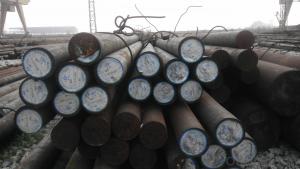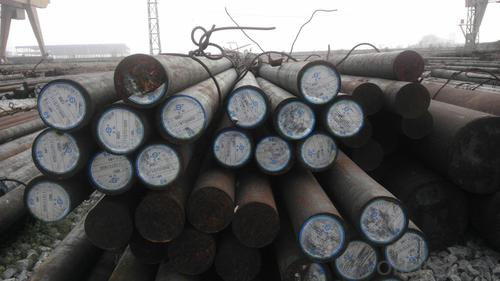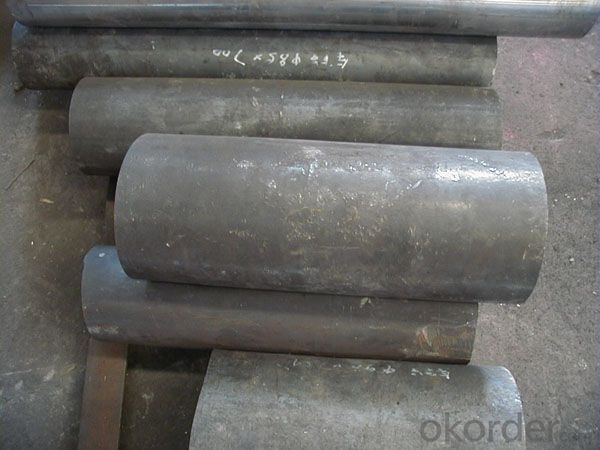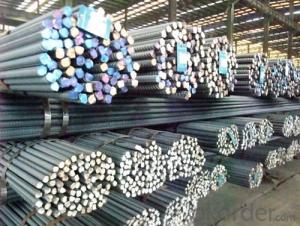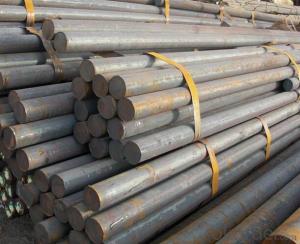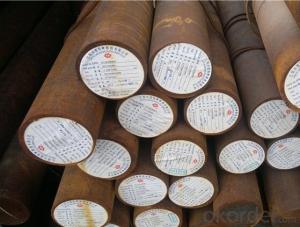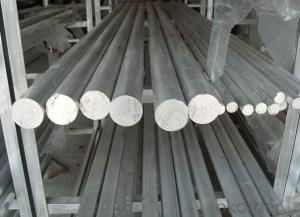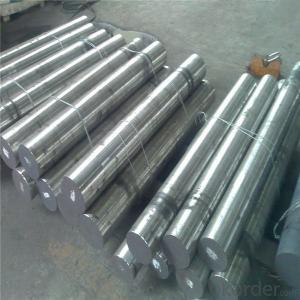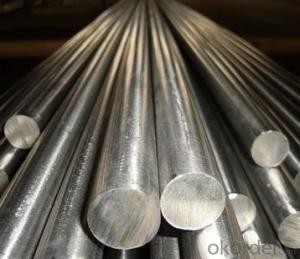Alloy Steel 6542 High Speed Tool Steel Special Steel
- Loading Port:
- China main port
- Payment Terms:
- TT OR LC
- Min Order Qty:
- 30 m.t.
- Supply Capability:
- 10000 m.t./month
OKorder Service Pledge
OKorder Financial Service
You Might Also Like
Specification
Chemical Composition(GB)%
| Standard | C | Si | Mn | P | S | Cr | W | Mo | V |
| W6Mo5Cr4V2 | 0.55-0.65 | ≤0.40 | ≤0.60 | ≤0.030 | ≤0.020 | 3.70-4.30 | 6.00-7.00 | 4.50-5.50 | 1.70-1.10 |
| M2 | 0.78-0.88 | 0.20-0.45 | 0.15-0.40 | ≤0.030 | ≤0.030 | 3.75-4.50 | 5.50-6.75 | 4.50-5.50 | 1.75-2.20 |
Heat Treatment
| Item | Temperature℃ | Hardness |
| Anneal | 840-860 | ≤255HB |
| Quenching | 1150-1180 | ≥60HRC |
| Tempering | 560-580 | ≥60HRC |
Applications:Used for various tools,large thermoplastic forming cutting tools,abrasion resistance components operating under high load such as cold extrusion dies
Main Product
Plastic Mould Steel
DIN 1.2311,1.2738,1.2083,1.2316 etc.
AISI P20,P20+Ni,420 etc.
JIS SUS420J2
Hot Work Steel
DIN 1.2344,1.2343,1.2367,1.2365,1.2581,1.2713 etc.
AISI H13,H11,H10,H21, etc.
JIS SKD61,SKD6,SKD5,SKT4 etc.
Cold Work Steel
DIN 1.2739, 1.2601, 1.2080, 1.2436, 1.2631, 1.263, 1.2510, 1.2327 etc.
AISI D2, D5, D3, D6, A8, A2, O1 etc.
JIS SKD10, SKD11, SKD1, SKS3 etc.
High Speed Steel
DIN 1.3343, 1.3243, 1.3247, 1.3355 etc.
AISI M2, M35, M42, T1 etc.
JIS SKH51, SKH35, SKH59, SKH2 etc.
Alloy Structural Steel
DIN 1.7035,1.6511,1.7220,1.7225 etc.
AISI 5140, 4340, 4135, 4140 etc.
JIS SCr440,SNCM439,SCM435,SCM440 etc.
Stainless & Carbon Steel or Others
DIN 1.4125,1.1191 etc
AISI 440C,1045, 1020 etc.
JIS SUS440C,S45C etc
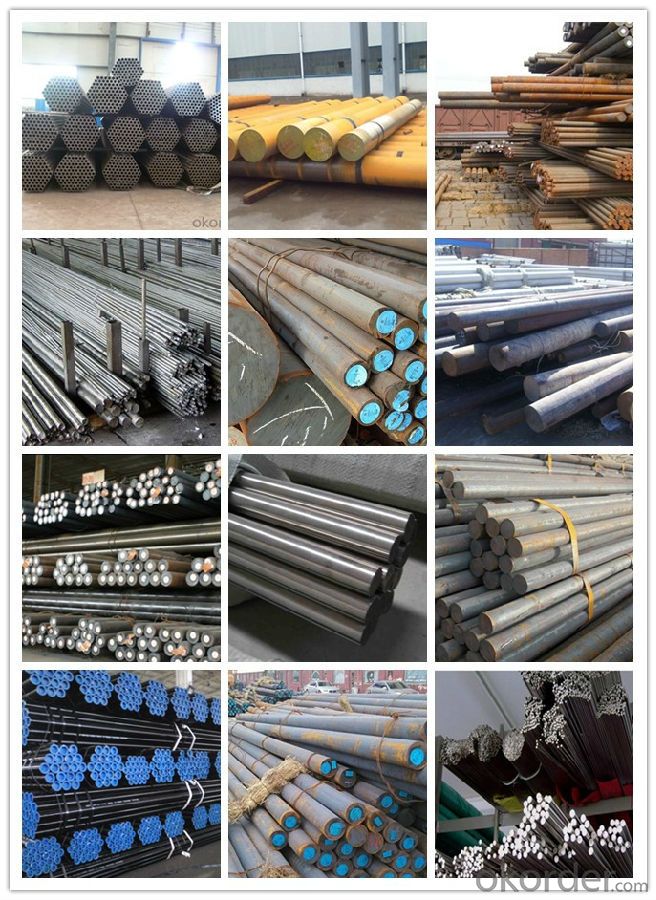 Product show
Product show
Workshop show
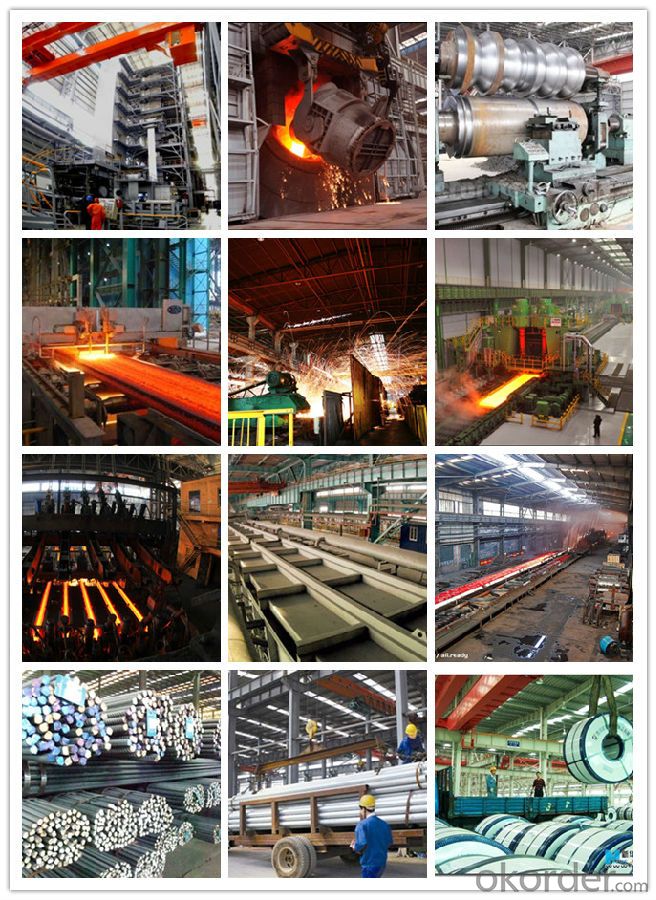
Shipping
1. FedEx/DHL/UPS/TNT for samples, Door-to-Door;
2. By Air or by Sea for batch goods, for FCL; Airport/ Port receiving;
3. Customers specifying freight forwarders or negotiable shipping methods!
Delivery Time: 3-7 days for samples; 5-25 days for batch goods.
Payment Terms
1.Payment: T/T, L/C, Western Union, MoneyGram,PayPal; 30% deposits; 70% balance before delivery.
2.MOQ: 1pcs
3.Warranty : 3 years
4.Package Informations: 1) EXPORT, In 20 feet (GW 25 ton) or 40 feet Container (GW 25 ton)
2)as customer's requirement
Why choose us?
(1) The leading exporter in China special steel industry.
(2) Large stocks for various sizes, fast delivery date.
(3) Good business relationship with China famous factories.
(4) More than 7 years steel exporting experience.
(5) Good after-sales service guarantee.
- Q: How does the heat treatment process affect the hardness of special steel?
- The hardness of special steel is greatly influenced by the heat treatment process. This process involves heating the steel to a specific temperature, maintaining it at that temperature for a certain period, and then cooling it at a controlled rate. By altering the microstructure of the steel, the heat treatment process impacts its hardness. Quenching, which is one of the most commonly used heat treatment techniques, involves rapidly cooling the steel. This results in the formation of martensite, a hard and brittle microstructure. The rapid cooling prevents the formation of softer microstructures like pearlite or ferrite, leading to an increase in the steel's hardness. Tempering is another heat treatment process that affects the hardness of special steel. After quenching, the steel is often tempered to decrease its brittleness and enhance its toughness. This involves reheating the quenched steel to a lower temperature and then slowly cooling it. Through this process, some of the martensite transforms into a more ductile microstructure, such as tempered martensite or bainite. These microstructures retain some of the hardness of martensite while also providing improved toughness and resistance to fracture. To summarize, the heat treatment process plays a significant role in determining the hardness of special steel. Quenching increases hardness by forming martensite, whereas tempering balances hardness with improved toughness. By adjusting parameters such as temperature and cooling rate, the desired hardness and mechanical properties can be achieved for different applications of special steel.
- Q: What are the different coating techniques for special steel parts?
- There are several coating techniques that can be used for special steel parts, depending on the specific requirements and desired properties. Here are some of the commonly used coating techniques: 1. Electroplating: This technique involves depositing a layer of metal onto the surface of the steel part through an electrochemical process. It provides excellent corrosion resistance and can also enhance the appearance of the part. 2. Thermal spraying: This technique involves melting or heating a coating material and spraying it onto the steel surface. It can be done using various methods such as flame spraying, plasma spraying, or arc spraying. Thermal spraying is commonly used to provide wear resistance, thermal insulation, or to restore damaged parts. 3. PVD (Physical Vapor Deposition): PVD is a vacuum coating technique where a thin film is deposited onto the steel surface. This method offers a wide range of coatings, including decorative finishes, hard coatings for wear resistance, and low-friction coatings. 4. DLC (Diamond-Like Carbon) coating: DLC is a type of PVD coating that provides a thin layer of carbon-based material with properties similar to diamond. It offers excellent hardness, low friction, and high wear resistance, making it suitable for applications where durability and performance are crucial. 5. Powder coating: Powder coating involves applying a dry powder to the steel part and then curing it through heat or ultraviolet light. This technique provides a durable and attractive finish, offering excellent corrosion resistance and protection against impact and abrasion. 6. Chemical conversion coating: This technique involves treating the steel surface with a chemical solution that forms a protective layer on the surface. Common types of chemical conversion coatings include phosphating, chromating, and anodizing. These coatings improve corrosion resistance, paint adhesion, and can also provide electrical conductivity. It is essential to choose the appropriate coating technique based on factors such as the desired properties, environmental conditions, cost-effectiveness, and the specific application requirements for special steel parts.
- Q: What are the different methods of preventing hydrogen embrittlement in special steel?
- Preventing hydrogen embrittlement in special steel can be achieved through various methods. Firstly, selecting the appropriate steel type that has a lower susceptibility to embrittlement is an effective preventive measure. Opting for steels with lower alloy content or different composition can be advantageous, as high strength and hardness can make steels more prone to embrittlement. Controlled heat treatment is another method that can reduce the risk of hydrogen embrittlement. Tempering and annealing at specific temperatures can relieve internal stresses and minimize the impact of hydrogen absorption. To prevent or reduce the amount of hydrogen in the steel, hydrogen mitigation techniques can be utilized. These techniques include preheating the steel before hydrogen exposure, implementing desorption methods like vacuum annealing to remove trapped hydrogen, and using hydrogen scavenger coatings or inhibitors to capture or neutralize hydrogen. Stress reduction is crucial in preventing hydrogen embrittlement. Implementing stress relief techniques such as shot peening or stress-relieving heat treatments can significantly reduce the potential for embrittlement. Proper handling and storage of the steel are also important. It is vital to protect the steel from hydrogen-rich environments during manufacturing, handling, or storage stages. This can be achieved through careful consideration of cleaning or pickling processes, appropriate packaging, and storage techniques such as using dry environments or protective coatings. Regular maintenance and inspection of steel components are essential to identify signs of hydrogen embrittlement at an early stage. This allows for timely repairs or replacements to prevent catastrophic failures. It is important to note that the specific methods employed to prevent hydrogen embrittlement may vary depending on the application, type of steel, and environmental conditions. Consulting with experts and adhering to industry standards and guidelines are crucial to ensure effective prevention of hydrogen embrittlement in special steel.
- Q: How is precipitation-hardening steel used in the aerospace industry?
- Precipitation-hardening steel is commonly used in the aerospace industry due to its exceptional strength-to-weight ratio and high corrosion resistance. This type of steel undergoes a specialized heat treatment process that allows for the precipitation of particles within its microstructure, resulting in improved mechanical properties. These steels are used in various components and structures of aircraft, such as landing gears, engine parts, and structural frames, where strength, durability, and weight savings are crucial factors for performance and safety.
- Q: How does special steel contribute to reducing product costs?
- Special steel contributes to reducing product costs in several ways. Firstly, special steel is known for its high strength and durability, which allows manufacturers to design and produce products that have a longer lifespan. This reduces the need for frequent replacements or repairs, thus saving costs in the long run. Additionally, special steel can be customized to meet specific requirements, allowing for the production of lighter and more efficient products. This can lead to savings in terms of raw material usage, transportation costs, and energy consumption. Moreover, special steel often has excellent corrosion resistance, reducing the need for additional protective coatings or maintenance, which can also result in cost savings. Overall, the utilization of special steel in manufacturing processes helps optimize product performance, longevity, and efficiency, thereby contributing to reducing product costs.
- Q: What are the main applications of special steel?
- Special steel has a wide range of applications in various industries such as automotive, aerospace, construction, energy, and manufacturing. It is commonly used for the production of high-performance components, tools, and machinery parts that require exceptional strength, durability, and resistance to corrosion and heat. Additionally, special steel is utilized in the production of surgical instruments, cutlery, and various consumer goods that require high-quality materials to ensure reliability and longevity.
- Q: Can special steel be used in food processing?
- Food processing can indeed utilize special steel. The food processing industry commonly relies on special steels, like stainless steel, because of their distinct properties that make them suitable for safely handling food. Stainless steel, for example, is frequently chosen due to its resistance to corrosion, which makes it an excellent option for handling acidic or salty foods without the fear of contamination. Moreover, stainless steel is non-reactive, ensuring that no harmful substances are released into the food during processing. Furthermore, stainless steel is easy to clean and maintain, guaranteeing the maintenance of high hygiene standards in food processing facilities. As a result of these qualities, special steels, including stainless steel, find extensive use in the manufacturing of food processing equipment, such as tanks, pipes, and utensils.
- Q: How does special steel play a role in the defense sector?
- Special steel plays a crucial role in the defense sector due to its unique properties and characteristics that make it highly suitable for various applications. Firstly, special steel offers exceptional strength and durability, making it ideal for manufacturing military vehicles, armored personnel carriers, and tanks. These vehicles require materials that can withstand high impacts, resist deformation, and provide protection against enemy attacks. Additionally, special steel is used in the production of military aircraft and naval vessels. Its high strength-to-weight ratio allows for the construction of lightweight yet robust structures, enabling aircraft to carry heavy payloads and naval vessels to navigate through harsh conditions. Moreover, special steel's corrosion resistance properties make it suitable for marine environments, ensuring the longevity and reliability of naval assets. Furthermore, special steel is utilized in the production of weapons and ammunition. Its hardness and toughness attributes make it suitable for manufacturing firearm barrels, armor-piercing projectiles, and other critical components. Special steel's ability to withstand extreme pressures, temperatures, and impact forces ensures the accuracy, reliability, and effectiveness of military weaponry. Moreover, special steel is also employed in the defense sector for the production of communication and surveillance equipment. Its electromagnetic properties allow for the fabrication of radar systems, antennas, and electronic enclosures that are essential for military operations. Special steel's resistance to electromagnetic interference ensures the integrity and security of communication systems, enhancing the overall efficiency and effectiveness of defense operations. In summary, special steel plays a vital role in the defense sector by providing the necessary strength, durability, corrosion resistance, and electromagnetic properties required for various applications. Its utilization in military vehicles, aircraft, naval vessels, weapons, and communication equipment enhances the overall capabilities, effectiveness, and safety of defense forces, ensuring national security.
- Q: How does special steel perform under low temperatures?
- Special steel generally performs well under low temperatures. It has good toughness and ductility, which allows it to withstand cold temperatures without becoming brittle or losing its structural integrity. This makes it suitable for various applications in industries such as aerospace, oil and gas, and automotive, where low-temperature environments are encountered.
- Q: How does special steel perform in high-temperature hydrogen environments?
- Special steel is known for its excellent performance in high-temperature hydrogen environments. It exhibits superior resistance to hydrogen embrittlement, corrosion, and material degradation, making it a suitable choice for applications where exposure to high-temperature hydrogen is prevalent. The steel's unique composition and heat treatment processes enhance its mechanical properties and enable it to maintain its structural integrity even in challenging conditions. Overall, special steel demonstrates remarkable performance and reliability when subjected to high-temperature hydrogen environments.
Send your message to us
Alloy Steel 6542 High Speed Tool Steel Special Steel
- Loading Port:
- China main port
- Payment Terms:
- TT OR LC
- Min Order Qty:
- 30 m.t.
- Supply Capability:
- 10000 m.t./month
OKorder Service Pledge
OKorder Financial Service
Similar products
Hot products
Hot Searches
Related keywords
